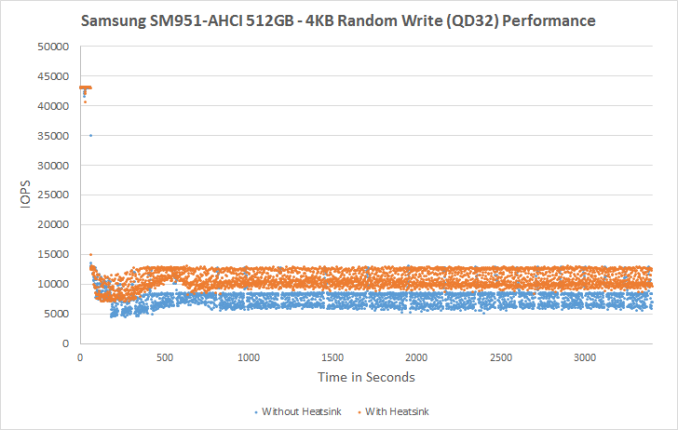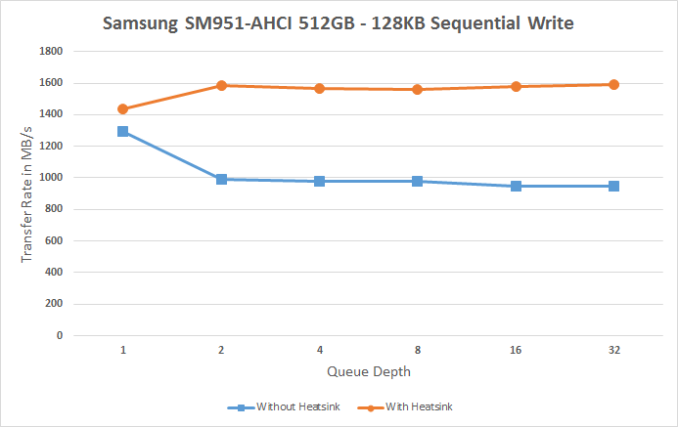Samsung SM951-NVMe (256GB) PCIe SSD Review
by Kristian Vättö on June 25, 2015 9:40 AM ESTThermal Throttling Revisited
When we first tested the SM951-AHCI in February, I noted that the drive seems to be suffering from thermal throttling when subjected to sustained workloads, especially sequential writes. I promised to run tests with a heatsink attached to see what the performance would be without any thermal limitations and now I have some results to present.
For these tests I used the stock 512GB SM951-AHCI and borrowed the M.2 to PCIe adapter with a heatsink from Plextor's M6e Black Edition. Unfortunately I had to send my M6e samples back before I could test the SM951-NVMe, but the purpose of these tests is more to show the impact of thermal throttling in actual client workloads rather than demonstrate the maximum peak performance.
| Samsung SM951-AHCI 512GB Performance | |||
| With Heatsink | Without Heatsink | Performance Delta | |
| The Destroyer (Data Rate) | 471.53MB/s | 455.65MB/s | -3.4% |
| The Destroyer (Latency) | 1323.6µs | 1388.4µs | -4.9% |
| Heavy (Data Rate) | 802.42MB/s | 802.17MB/s | 0.0% |
| Heavy (Latency) | 180.26µs | 181.39µs | -0.6% |
| Light (Data Rate) | 1,250MB/s | 1,240MB/s | -1.0% |
| Light (Latency) | 69.08µs | 69.19µs | -0.2% |
It's clear that the impact of thermal throttling in real world workloads is insignificant. In a worst case scenario where the drive is under a heavy IO workload the performance loss can be 5%, but in anything less intensive the difference is within the margin of error. Even though we truncate idle times to 25µs, it's enough to lighten the workload and reduce thermal throttling compared to a sustained synthetic workload.
Under a sustained 4KB random write workload the difference is more significant as without the heatsink the SM951-AHCI averages 7,878 IOPS, whereas the heatsink bumps that up to 10,873 IOPS.
The same goes for sequential write where throttling is evident and even more significant compared to the random write workload. Without the heatsink the SM951 can sustain peak throughput for about two minutes, which may not sound long but at 1.5GB/s that would translate to 180GB of data written and obviously such massive transfers are very rare.
To sum things up, there is no need to worry about thermal throttling under typical client workloads. There won't be any notable performance loss unless you subject the drive under an intensive sustained workload, which may be relevant to some professional users (e.g. high-end video editing), but not for the typical enthusiast and power user. If you want to ensure that your SM951 operates at full performance at all times, it's not a bad idea to get an adapter with a heatsink, but there is no loss in running the drive without one.












74 Comments
View All Comments
Dasa2 - Monday, June 29, 2015 - link
i would also like to know how cpu usage is affectedit may not be of any significance with a 4790k but with a i3\i5nuc?
i would also be interested to see if ram speed has any effect on such high speed ssd speed in a nuc since most people seem to buy 1600c11 sodimm for them
iwod - Thursday, June 25, 2015 - link
What is stopping us to getting a 32 Channel SSD Controller?Cost? Or we wait for 3D NAND to push to the max 3.2GB/s a PIC-E 3.0 x4 allows?
What's next then? PCI-E 4.0 isn't even on the Cannonlake Roadmap.
And even with the 4x PCI-E 4.0 it seems to be too little headroom for SSD.
Where is the next bottleneck?
Kristian Vättö - Friday, June 26, 2015 - link
There are some 32-channel controllers in the enterprise space, but as you suspected the reason why we don't see those in the client market is cost.Right now I would say the biggest bottleneck is software design because everything (except some enterprise applications) is still designed for high latency storage (i.e. load everything to RAM and as little disk access as possible, whereas by properly utilizing the low latency of SSDs applications performance could be improved.
stevae - Friday, June 26, 2015 - link
OK, so a couple of things here. first, while windows 10 10130 is still a little buggy, i already have 10147 and it is rock solid. many improvements. next, i am running it on a samsung 951. boots very nice, there is no more error when restarting like there was in 10130, and things are smooth. however, it doesn't run at full speed. on crystal disk mark i get 1569 sequential read, and 1474 sequential write. and my sm951 is the ahci version. but this leads me to the BIG quesiton, since you guys said that the hardware is the same between the ahci and nvme versions, does that mean when the nvme version comes out and is sold widely, that i can download firmware to turn my ahci version into a nvme version?yeeeeman - Friday, June 26, 2015 - link
These SSDs are good for driving the performance up, especially for datacenters. In home usage, I swear that a Samsung 840 PRO is gonna satisfy all your hidden performance dreams. Period.JKJK - Friday, June 26, 2015 - link
You really didn't get the low-queue-depth-performance-and-low-latency-for-client-workloads-part, did you?I'm going to get me a few of these, as soon as they're available.
Shinzon - Friday, June 26, 2015 - link
I just build new main desktop and added also a 951 AHCI version and the difference from my 840 pro to this is very noticeable, almost as from mechanic drive to a SSD all over again. I can even feel the difference from the 951 and to my 2 840 pros in raid 0. So that comment is not very professional :-)Shinzon - Friday, June 26, 2015 - link
@ Kristian VättöAs someone else already speculated, could we please research some more if the AHCI version can be re flashed to NVMe version ? Of course Samsung answer will be: not supported because it's OEM product, warranty void and the whole swada but I guess it's a question of getting a flash program that supports the controller EPROM they use and copy the NVMe firmware and then reflash the AHCI version. I think many would be interested in this.
Tack för dina altid fina reviews :-)
dcaxax - Friday, June 26, 2015 - link
Two words about Samsung SSD's. Never. Again.stevae - Friday, June 26, 2015 - link
yeah, why would you. they only lead the ssd world 95% of the time. sure, you go ahead and stick with that ocz crap.